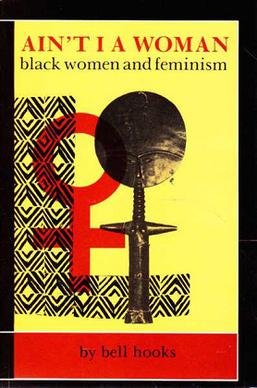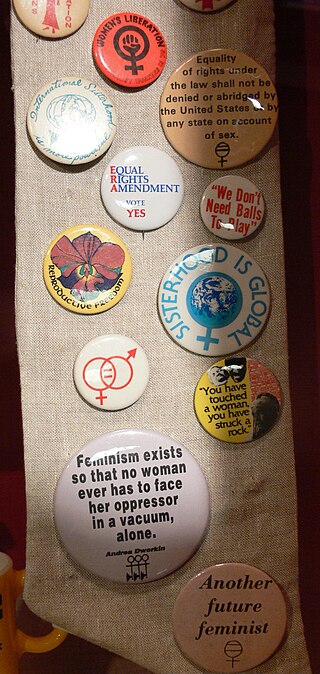
Ain't I a Woman? Black Women and Feminism is a 1981 book by bell hooks titled after Sojourner Truth's "Ain't I a Woman?" speech. hooks examines the effect of racism and sexism on Black women, the civil rights movement, and feminist movements from suffrage to the 1970s. She argues that the convergence of sexism and racism during slavery contributed to Black women having the lowest status and worst conditions of any group in American society. White female abolitionists and suffragists were often more comfortable with Black male abolitionists such as Frederick Douglass, while southern segregationalists and stereotypes of Black female promiscuity and immorality caused protests whenever Black women spoke. hooks points out that these white female reformers were more concerned with white morality than the conditions these morals caused Black Americans.

Vandana Shiva is an Indian scholar, environmental activist, food sovereignty advocate, ecofeminist and anti-globalization author. Based in Delhi, Shiva has written more than 20 books. She is often referred to as "Gandhi of grain" for her activism associated with the anti-GMO movement.

Gloria Jean Watkins, better known by her pen name bell hooks, was an American author, theorist, educator, and social critic who was a Distinguished Professor in Residence at Berea College. She is best known for her writings on race, feminism, and class. The focus of hooks' writing was to explore the intersectionality of race, capitalism, and gender, and what she described as their ability to produce and perpetuate systems of oppression and class domination. She published around 40 books, including works that ranged from essays, poetry, and children's books. She published numerous scholarly articles, appeared in documentary films, and participated in public lectures. Her work addressed love, race, class, gender, art, history, sexuality, mass media, and feminism.
South End Press was a non-profit book publisher run on a model of participatory economics. It was founded in 1977 by Michael Albert, Lydia Sargent, Juliet Schor, among others, in Boston's South End. It published books written by political activists, notably Arundhati Roy, Noam Chomsky, bell hooks, Winona LaDuke, Manning Marable, Ward Churchill, Cherríe Moraga, Andrea Smith, Howard Zinn, Jeremy Brecher and Scott Tucker. South End Press closed in 2014.

Intersectionality is a feminist analytical framework for understanding how groups' and individuals' social and political identities result in unique combinations of discrimination and privilege. Examples of these factors include gender, caste, sex, race, ethnicity, class, sexuality, religion, disability, height, age, weight, species and physical appearance. These intersecting and overlapping social identities may be both empowering and oppressing. However, little good-quality quantitative research has been done to support or undermine the practical uses of intersectionality.
Black feminism, also known as Afro-feminism chiefly outside the United States, is a branch of feminism that focuses on the African-American woman's experiences and recognizes the intersectionality of racism and sexism. Black feminism also acknowledges the additional marginalization faced by black women due to their social identity.

The feminist school of criminology is a school of criminology developed in the late 1960s and into the 1970s as a reaction to the general disregard and discrimination of women in the traditional study of crime. It is the view of the feminist school of criminology that a majority of criminological theories were developed through studies on male subjects and focused on male criminality, and that criminologists often would "add women and stir" rather than develop separate theories on female criminality.
In the early 1960s, an interest in women and their connection with the environment was sparked, largely by a book written by Esther Boserup entitled Woman's Role in Economic Development. Starting in the 1980s, policy makers and governments became more mindful of the connection between the environment and gender issues. Changes began to be made regarding natural resource and environmental management with the specific role of women in mind. According to the World Bank in 1991, "Women play an essential role in the management of natural resources, including soil, water, forests and energy...and often have a profound traditional and contemporary knowledge of the natural world around them". Whereas women were previously neglected or ignored, there was increasing attention paid to the impact of women on the natural environment and, in return, the effects the environment has on the health and well-being of women. The gender-environment relations have valuable ramifications in regard to the understanding of nature between men and women, the management and distribution of resources and responsibilities, and the day-to-day life and well-being of people.
Sun Yung Shin is a Korean American poet, writer, consultant, and educator living in Minneapolis, Minnesota.
INCITE! Women, Gender Non-Conforming, and Trans people of Color Against Violence, formerly known as INCITE! Women of Color Against Violence, is a United States-based national activist organization of radical feminists of color advancing a movement to end violence against women of color and their communities. INCITE! is organized by a national collective of women of color and has active chapters and affiliates in San Francisco, Washington, D.C., Denver, Albuquerque, Austin, New Orleans, Boston, Philadelphia, New York City, Ann Arbor, Binghamton, Chicago, and a chapter in Toronto, Ontario, Canada. INCITE! was founded in 2000.

Kimberlé Williams Crenshaw is an American civil rights advocate and a leading scholar of using critical race theory as a lens to further explore and examine the Tulsa race massacre. She is a professor at the UCLA School of Law and Columbia Law School, where she specializes in race and gender issues.

A variety of movements of feminist ideology have developed over the years. They vary in goals, strategies, and affiliations. They often overlap, and some feminists identify themselves with several branches of feminist thought.
Sally J. Scholz is an American Professor of Philosophy at Villanova University and former editor of Hypatia: A Journal of Feminist Philosophy. Her research focuses on social philosophy, political philosophy, and feminist theory. Her early work involves issues of violence against women, oppression and peacemaking, and then progresses to ethics of advocacy and violence against women in conflict settings, including war rape and just war theory. Her recent research involves these issues in addition to solidarity. She has published four single-author books and edited three academic journals, among many other publications.

Ecofeminism is a branch of feminism and political ecology. Ecofeminist thinkers draw on the concept of gender to analyse the relationships between humans and the natural world. The term was coined by the French writer Françoise d'Eaubonne in her book Le Féminisme ou la Mort (1974). Ecofeminist theory asserts a feminist perspective of Green politics that calls for an egalitarian, collaborative society in which there is no one dominant group. Today, there are several branches of ecofeminism, with varying approaches and analyses, including liberal ecofeminism, spiritual/cultural ecofeminism, and social/socialist ecofeminism. Interpretations of ecofeminism and how it might be applied to social thought include ecofeminist art, social justice and political philosophy, religion, contemporary feminism, and poetry.
Multiracial feminist theory is promoted by women of color (WOC), including Black, Latina, Asian, Native American, and anti-racist white women. In 1996, Maxine Baca Zinn and Bonnie Thornton Dill wrote “Theorizing Difference from Multiracial Feminism," a piece emphasizing intersectionality and the application of intersectional analysis within feminist discourse.
White feminism is a term which is used to describe expressions of feminism which are perceived as focusing on white women but are perceived as failing to address the existence of distinct forms of oppression faced by ethnic minority women and women lacking other privileges. The term has been used to label and criticize theories that are perceived as focusing solely on gender-based inequality. Primarily used as a derogatory label, "white feminism" is typically used to reproach a perceived failure to acknowledge and integrate the intersection of other identity attributes into a broader movement which struggles for equality on more than one front. In white feminism, the oppression of women is analyzed through a single-axis framework, consequently erasing the identity and experiences of ethnic minority women the space. The term has also been used to refer to feminist theories perceived to focus more specifically on the experience of white, cisgender, heterosexual, able-bodied women, and in which the experiences of women without these characteristics are excluded or marginalized. This criticism has predominantly been leveled against the first waves of feminism which were seen as centered around the empowerment of white middle-class women in Western societies.
Queer of color critique is an intersectional framework, grounded in Black feminism, that challenges the single-issue approach to queer theory by analyzing how power dynamics associated race, class, gender expression, sexuality, ability, culture and nationality influence the lived experiences of individuals and groups that hold one or more of these identities. Incorporating the scholarship and writings of Audre Lorde, Gloria Anzaldúa, Kimberlé Crenshaw, Barbara Smith, Cathy Cohen, Brittney Cooper and Charlene A. Carruthers, the queer of color critique asks: what is queer about queer theory if we are analyzing sexuality as if it is removed from other identities? The queer of color critique expands queer politics and challenges queer activists to move out of a "single oppression framework" and incorporate the work and perspectives of differently marginalized identities into their politics, practices and organizations. The Combahee River Collective Statement clearly articulates the intersecting forces of power: "The most general statement of our politics at the present time would be that we are actively committed to struggling against racial, sexual, heterosexual, and class oppression, and see as our particular task the development of integrated analysis and practice based upon the fact that major systems of oppression are interlocking. The synthesis of these oppressions creates the conditions of our lives." Queer of color critique demands that an intersectional lens be applied queer politics and illustrates the limitations and contradictions of queer theory without it. Exercised by activists, organizers, intellectuals, care workers and community members alike, the queer of color critique imagines and builds a world in which all people can thrive as their most authentic selves- without sacrificing any part of their identity.
George Dewey Yancy is an American philosopher who is the Samuel Candler Dobbs Professor of Philosophy at Emory University. He is a distinguished Montgomery Fellow at Dartmouth College, one of the college's highest honors. In 2019–20, he was the University of Pennsylvania's Inaugural Provost's Distinguished Visiting Faculty Fellow. He is the editor for Lexington Books' "Philosophy of Race" book series. He is known for his work in critical whiteness studies, critical philosophy of race, critical phenomenology, and African American philosophy, and has written, edited, or co-edited more than 20 books. In his capacity as an academic scholar and a public intellectual, he has published over 200 combined scholarly articles, chapters, and interviews that have appeared in professional journals, books, and at various news sites.

The feminist philosophy journal Hypatia became involved in a dispute in April 2017 that led to the online shaming of one of its authors, Rebecca Tuvel, an assistant professor of philosophy at Rhodes College in Memphis. The journal had published a peer-reviewed article by Tuvel in which she compared the situation of Caitlyn Jenner, a trans woman, to that of Rachel Dolezal, a white woman who identifies as black. When the article was criticized on social media, scholars associated with Hypatia joined in the criticism and urged the journal to retract it. The controversy exposed a rift within the journal's editorial team and more broadly within feminism and academic philosophy.
Julia Chinyere Oparah, formerly Julia Sudbury, is a British professor and department chair of Ethnic Studies at Mills College in Oakland California, where she also played a major role in establishing its Queer Studies Program. She is an activist-scholar, a community organizer, and an intellectual focused on producing relevant scholarship in accompaniment to social justice movements.